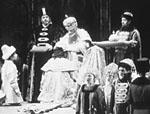Opera directors are notorious for the liberties they take with the works entrusted them, almost always in the name of “relevance.” That said, there couldn’t be a more promising candidate for imaginative updating than Boris Godunov. The events it dramatizes took place around 1600, were dramatized by Pushkin in the early 1820s, and were set to music by Mussorgsky in 1869, but the work’s bitter, ironic, and ultimately despairing vision of a Russia in suicidal conflict couldn’t be more timely.
Boris Godunov
Opera House till January 29
What an opportunity for outrage for an American-born director making his US debut after decades in Germany, the very hotbed of operatic experiment! Yet Chris Alexander’s staging of Boris for Seattle Opera is outrageous only to the degree it turns one of the most individual musical theater works ever written into generic “grand opera.” Its conventionality would have looked uninspired and old-fashioned in the 1950s.
The trouble starts as soon as the curtain rises. The first scene of Mussorgsky’s opera indelibly outlines the fractured Russian soul by deploying not one but two choral groups. The first is a grumpy, indifferent ragtag rounded up by Boris’ minions to stage a show of public support for his elevation to czardom. The second is a band of ecstatic pilgrims passing by, calling down heaven’s blessings on benighted Russia. All this is clearly delineated in Mussorgsky’s stage directions. Two choruses intimate two minds, two souls.
As the curtain rises in Alexander’s staging, chorus one enters silently and reverently in darkness, votive candles in their hands. (A uniformed guard strides about among them, cracking a feeble little excuse for a whip for no discernible reason.) After a while they are joined by more choristers, these carrying portraits of saints. All sing powerfully together. Then everybody leaves. Curtain, with not a soul in the audience a particle the wiser about what has just happened.
This inexplicable reduction of a powerful expository scene to a static tableau not only fails to jump-start the drama, it deprives the coronation scene that follows of half its power and all its significance. If you don’t see the machinery operating behind the gilded surface, the accession of Boris amid gold, rejoicing, and the clangor of bells is just so much pageantry.
Despite its title, Boris Godunov is not one man’s tragedy, nor, strictly speaking, a drama of individuals at all. But powerful performances can salvage much, even from a production as routine as this one. Alesandr Anisimov as Boris has an immense advantage over his fellow cast members in actually understanding the words he is singing, as well as possessing a powerful and flexible voice. But for whatever reason, he provides only about a third of the character Pushkin and Mussorgsky imagined; the gentle father and superstitious paranoid are there, but the ambition and cruelty that drove him to the throne and the psychic terror that ultimately destroy him are nowhere to be seen.
Thomas Harper has turned in impressive work for Seattle Opera as the malignant dwarf Mime in Wagner’s Ring. There’s something of the malignant dwarf in his portrayal of Boris’ fateful antagonist, the monk-turned-agitator Grigori. Harper sings the brief role well enough, but, fitted out in a shrieking red wig and slinking about stealthily like a road-company Iago, he is hardly the man your typical Polish mob would choose to follow into battle. Peter Kazaras, another able Seattle Opera regular, is a nullity as the reptilian Prince Shuiski: a mobile pyramid of lavish costumery with a head on top. Kevin Langan sings out bravely as the totteringly frail historian-monk Pimen; perhaps a bit too bravely, since he comes off sounding healthier than anyone else in the cast. The remaining performers sing ably, but are asked for and provide nothing in the way of acting beyond clich鮍
In the pit George Manahan gets a spirited performance from the Seattle Symphony; lovers of the opera can derive a good deal of pleasure by simply shutting their eyes and imagining their own production. But even here their enjoyment can’t help but be compromised by the “edition” of the opera being performed. Mussorgsky’s original 1869, seven-scene version runs a taut two hours, wholly focused on the drama at hand. His 1872 revision is more than an hour longer and little short of grand opera in scale and lavishness.
Today, no one would think of using Rimsky-Korsakov’s lush rewriting of Mussorgsky’s spare orchestrations. But for some reason, the composer’s dramaturgy doesn’t deserve the same respect. In Seattle Opera’s version, bits and pieces of 1872 are wedged here and there into 1869. Individually, there’s a plausible argument for each addition: half a scene here, a melody in folk-style there. But in the theater, every single one proves a dead weight. Again the composer proves the best judge of his own work. Somehow we never learn.








